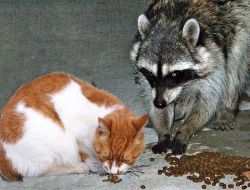Do raccoons kill cats?
 |
For some raccoons are mischievous but lovable furry creatures that bring a bit of the wild into suburban areas. For others raccoons are murderous vandals which pose a serious risk to the health and safety of their pets. So which is it? There can be no doubt that the question is becoming ever more important, as raccoons are coming into contact with humans and their pets more and more often - and not just in north America. For once human-raccoon interaction is not caused so much by humans invading the raccoon habitat as by raccoons invading ours. Raccoons are very adaptable animals and they have been moving from country to the city in large numbers. Like humans the raccoons find urban life offers convenience and easy access to food.
Some experts maintain that raccoon urbaniensis is almost a new subspecies of raccoon. With their very dexterous front paws raccoons open bins, door and cupboards almost as easily as humans do. They are also much more habituated to humans than their wilder country cousins, and generally speaking, humans don't scare them much.
Raccoons are true omnivores and consider the average suburban yard as an all-you-can-eat buffet. They will eat almost anything they find there from rodents and birds to pet food and back-yard grapes or even the gold fish in your ornamental pond. And they have quickly figured out that once they get into the house through an open window or big enough cat-flap, there is plenty of food in the cupboards. Just don’t expect them to wash up and tidy the place afterwards.
In North America raccoons can be seen everywhere, home gardens to parks and university campuses (yes they do say that raccoons are very intelligent). Although raccoons are native to North America, these days they are breeding happily in European cities as well. They were introduced to Germany and Northern France in early to mid 20th century. They were also introduced to Russia for hunting and as pets into Japan, and have happily settled down to compete with wild species in both areas. In Europe, Germany has the largest population of raccoons, but all of Germany’s neighbours now have reported raccoon sightings, and there is no doubt that this intelligent and adaptable animal will be making itself at home there too.
After being charmed by the first impression of these undoubtedly cute animals, many people start to wonder uneasily whether a raccoon is a danger to their pet. While outdoor cats and small dogs are at obvious risk, raccoons are adept at getting into houses, and an animal that will happily gobble up your tropical fish might do the same to a kitten.
The reality is somewhat more reassuring for people with cats. How dogs and raccoons get on depends on the size and aggression of the dog. But while dogs may attack a raccoon, a cat will generally pretend to ignore coons, and try to be ‘co-incidentally’ elsewhere while the beast is around. Since raccoons usually ignore or avoid cats, the two species often get along fine by not getting along together at all.
This does not mean that conflict may not arise. Like cats, raccoons have individual personalities, and when a bloody-minded raccoon meets a stubborn cat, fur is likely to fly. This is particularly likely when there is a dispute over the food. Raccoons are fond of cat food and if there is any on offer they will make sure they get their share. The video below demonstrates this very clearly.
Now, on this video the coon in question is young and non-aggressive. More mature raccoons may pose a threat, because if a cat stands her ground against an aggressive raccoon and battle ensues, the cat is likely to lose. The two references at the end of this article show what happens when raccoons do pick a fight with cats (some of the pictures in the first article are quite disturbingly graphic). However, unprovoked attacks on domestic cats are fortunately quite rare, and with a bit of forethought and a few precautions, you can help to make them rarer still.
The best way to protect your outdoor cat from raccoons in your yard is to make sure that there is no food and water available for them. If you feed your cats in the garden make sure that all is cleared away as soon as your cat has finished her meal. If you must leave the food outside, a bit of ingenuity goes a long way. Although raccoons are very good climbers, they can't jump. Here is an example of how you can use that to your advantage by creating a raised platform which a small creature can only access by jumping. A cat can do it with ease but for raccoons the food on the platform is unreachable.
Cat food is not the only source of food in agarden. Make sure that rubbish bins have tight lids or keep them in the shed. Removing a water source is also a good idea. Covering ponds and taking in the pet's water overnight is important. Fruit trees are always a problem in autumn. This is much harder to deal with. Short of removing the fruit as quickly as possible and not leaving over-ripe fruit laying on the ground there is little you can do. Since raccoons are generally nocturnal, having a bright light attached to a motion sensor can make them uncomfortable, but take care that it does not have the same effect on the neighbours. Likewise most things that repel raccoons - ultrasonics, predator urine, pepper sprays etc - also repel cats, and there is no point in driving off raccons if it causes your cat to leave home as well.
Home proofing is a good idea, starting with the cat flap. Mature raccoons are considerably bigger than cats, so a small cat flap will not let an adult raccoon in, but an open window anywhere in the house is a standing invitation. Assume that a raccoon can climb anything including a stucco wall.
Although raccoons often get about the day, they are mostly nocturnal. If you share your neighbourhood with raccoons, encourage your cat to stay indoors overnight as this will minimize the chances of contact between her and a local raccoon.
Finally one needs to consider infectious diseases. Raccoons are wild animals and may carry a number of pathogens which can infect both humans and pets. The most deadly of these is rabies. Rabid roccoons have been reported both in Canada and the USA. But the distribution of rabies in raccoons varies by region.
In North America, different strains of the virus are present in bats, dogs, foxes, skunks and raccoons, depending on the geographic area. The strain of rabies (mid-Atlantic) which is carried and transmitted by raccoons was first reported in Florida in the 1940s and has been slowly spreading northward ever since. In the 1970s cases of rabies were reported in Virginia and North Dakota. The first case in Ontario was northeast of Brockville in eastern Ontario in July 1999. To date, 132 cases have been reported in this same area. The last known case of raccoon rabies in Ontario was in September 2005.
On the other hand according to the Wildlife Health Fact sheet released in 2003 for British Columbia: "Insectivorous bats are the only wildlife reservoir of rabies in British Columbia, with sporadic cases occurring in other species. Since 1960, all rabies-positive cases have been bats or an occasional spillover of bat rabies into a small number of terrestrial mammals. There have been no cases in domestic dogs or wild carnivores of any species."
In the United States the 2006 survey of rabies showed that of the 6,940 documented rabies cases, 2,615 (37.7%) were in raccoons. In short the risk of rabies from raccoons very much depends on where you live.
If you are moving to the new area, your vet will be able to advise you on rabies in this area and whether you need rabies vaccinations for your pets. If your cat has been bitten by a raccoon or any other wild animal it may potentially have been exposed to rabies. You should contact your vet immediately.
References:
- Raccoon predation on domestic cats - ../raccoonpredationoncats.html
- They're urban raccoons, and they're not afraid (Masked bandits kill 10 cats, terrorize dogs, humans in Olympia, Wash.) - ../theyre-urban-raccoons-theyre-not-afraid/

